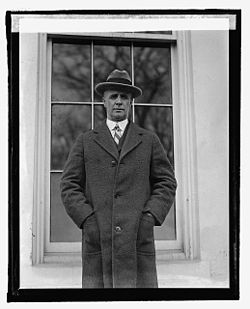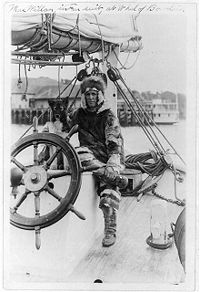- Donald Baxter MacMillan
-
For those of a similar name, see Donald McMillan (disambiguation).
Donald Baxter MacMillan (November 10, 1874 - September 7, 1970) was an American explorer, sailor, researcher and lecturer who made over 30 expeditions to the Arctic during his 46-year career. He pioneered the use of radios, airplanes, and electricity in the Arctic, brought back films and thousands of photographs of Arctic scenes, and put together a dictionary of the Inuktitut language.
Contents
Early life
Born in Provincetown, Massachusetts in 1874, MacMillan lived in Freeport, Maine after the deaths of both his parents in 1883 (his father died while captaining a Grand Banks fishing schooner) and 1886 (his mother died suddenly), and was educated at Bowdoin College in Brunswick, graduating in 1898 with a degree in geology. He later taught at Worcester Academy from 1903 to 1908.
Arctic explorations and two world wars
After ten years as a high school teacher, MacMillan caught the attention of explorer and fellow Bowdoin graduate Robert E. Peary when he saved the lives of nine shipwrecked people in two nights.[1] Peary subsequently invited MacMillan to join his 1908 journey to the North Pole. Although MacMillan himself had to turn back at 84°29' on March 14 because of frozen heels, Peary allegedly reached the Pole 26 days later.
MacMillan spent the next few years travelling in Labrador, carrying out ethnological studies among the Innu and Inuit. He organized and commanded the ill-fated Crocker Land Expedition to northern Greenland in 1913. Unfortunately Crocker Land turned out to be a mirage. The expedition members were stranded until 1917, when Captain Robert A. Bartlett of The Neptune finally rescued them.
After serving in the Navy during World War I, MacMillan began raising money for another Arctic expedition. In 1921, the schooner Bowdoin -- named for MacMillan's alma mater -- was launched from East Boothbay, Maine and set sail for Baffin Island, where MacMillan and his crew spent the winter. The expedition was notable for taking along an amateur radio operator, Don Mix, who used station WNP ("Wireless North Pole") to keep them in contact with the outside world. [2]
In September 1926 MacMillan led a group of explorers which included three women and five scientists to Sydney, Nova Scotia. The team spent several months beforehand collecting flora and fauna in Labrador and Greenland. He believed it was possible that the ancient ruins off Sculpin Island, twenty miles from Nain, Labrador, are the remains of a Norse settlement 1,000 years old. On the side bordering the mainland MacMillan found what he considered the vestiges of ten or twelve houses. He estimated the age of the dwellings to be hundreds of years old according to the lichens which partially covered their foundations. However MacMillan could not say for certain if these had been built by Vikings. According to Eskimo tradition the stone igloos were constructed by men who came from the sea in ships. Eskimos called the site Tunitvik, meaning the place of the Norseman. MacMillan said the strongest argument that the Sculpin dwellings were of Viking origin was their resemblance to those he found in Greenland the previous year.[3]
He joined the Navy again during World War II, serving in the Hydrographic Office in Washington, DC, and transferred the Bowdoin to the Navy for the duration of the war.
Later life
After the war, MacMillan continued his trips to the Arctic, taking researchers north and carrying supplies for the MacMillan-Moravian School he established in 1929. He made his final trip to the Arctic in 1957 at age 82, and lived until 1970. MacMillan is buried in Provincetown, Massachusetts, where a main wharf is named after him.
Honors
In 1927, the Boy Scouts of America made MacMillan an Honorary Scout, a new category of Scout created that same year. This distinction was give to "American citizens whose achievements in outdoor activity, exploration and worthwhile adventure are of such an exceptional character as to capture the imagination of boys...". The other eighteen who were awarded this distinction were: Roy Chapman Andrews; Robert Bartlett; Frederick Russell Burnham; Richard E. Byrd; George Kruck Cherrie; James L. Clark; Merian C. Cooper; Lincoln Ellsworth; Louis Agassiz Fuertes; George Bird Grinnell; Charles A. Lindbergh; Clifford H. Pope; George Palmer Putnam; Kermit Roosevelt; Carl Rungius; Stewart Edward White; Orville Wright. [4]
MacMillan Pier in Provincetown, Massachusetts is named in his honor.
External links
- A more complete MacMillan biography, courtesy of Bowdoin College
- The Peary-MacMillan Arctic Museum
- Bio by Laurel Gaudazno of Pilgrim Monument and Provincetown Museum
- An Arctic Expedition Rediscovered by Amy Nevala of Woods Hole Oceanographic Institution
References
- ^ West, James E. (1931). The Boy Scouts Book of True Adventure. New York: Putnam. OCLC 8484128.
- ^ John Dilks, Wireless North Pole Christmas, QST, December 2008, pp. 94-5.
- ^ "MacMillan Finds Old Norse Ruins". Associated Press in New York Times. September 5, 1926. http://select.nytimes.com/gst/abstract.html?res=F20D15FE3D5D13738DDDAC0894D1405B868EF1D3. Retrieved 2009-07-24. "Thinks Relics of Settlement Off Labrador Perhaps 1,000 Years Old. Sub-Arctic Expedition of Field Museum of Chicago Returns to Sydney. The authenticity of old legends telling of Norse settlements established in America by Vikings long before Columbus sailed for the New World has received ..."
- ^ "Around the World". Time (magazine). August 29 1927. http://www.time.com/time/magazine/article/0,9171,723029,00.html. Retrieved 2007-10-24.
Categories:- American explorers
- 1874 births
- 1970 deaths
- Bowdoin College alumni
- People from Freeport, Maine
- Baffin Island
- Explorers of the Arctic
- People from Provincetown, Massachusetts
- Crocker Land Expedition
Wikimedia Foundation. 2010.


